John Janaro's Blog, page 26
August 28, 2024
Saint Augustine Found the Truth in Jesus Christ and His Church
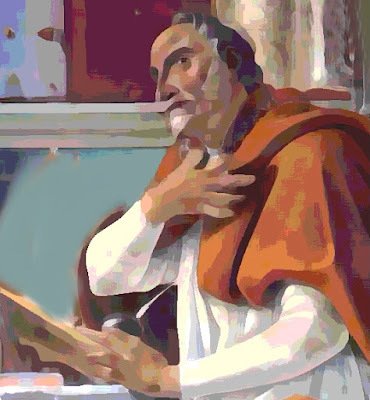 Happy Feast of Saint Augustine!
Happy Feast of Saint Augustine!The story of Augustine’s conversion is famous. Here is the text from an article I wrote n Magnificat long ago. I have been “recycling” older writings a bit more frequently lately, because I have been ill. These are stories and themes that never go “out of date.”
I have a further study of Augustine’s basic theological significance that is part of a chapter in my 2003 book, The Created Person and the Mystery of God. If I can find a digital copy of that book, I’ll share this section with you in the days to come. (Overall, the book is okay—some parts are better than others, and I would write a very different kind of book today, if I had the energy to do it. Perhaps I will in the future, but that’s in God’s hands.)
This article from 2014 is a brief appreciation of the monumental story of Saint Augustine’s conversion:
The story of St. Augustine’s conversion is one of the most famous in the history of Christianity, and indeed in the history of Western humanities and literature, thanks to the penetrating account of it that he gives in his epoch marking autobiographical work, the Confessions.
Augustine was born in Roman North Africa in 354, during a period of transition and religious instability that saw the rise of the recently legalized Christianity even as it struggled with the great heresy of the Arians, various gnostic groups and oriental mystery religions, and the prevailing decadence of the pagan social milieu.
As a young man, Augustine went to study at the cultural center of Carthage, where he was introduced to pagan morals. He took a concubine and embraced the Manichean sect, while also sharpening his mental and rhetorical skills. Eventually he traveled to Rome and Milan, abandoned the intellectually weak Manichean system, and dedicated himself to a genuine pursuit of truth through philosophy. Soon he found himself grappling with the claims of Christianity as his aesthetic and intellectual objections to it were overcome. What remained was the need for a conversion of heart, which came finally in the famous reading of Romans 13 in the garden in Milan (Confessions VIII.12).
The story of Augustine could be understood as an intellectual and moral journey, and these are certainly crucial elements. But its important, also, to emphasize the personal communication that pervades his whole experience of conversion. The Confessions make this clear by their genre; they are written as a prayer to God, and this is clearly more than a literary device. Augustine makes it clear that God’s grace and mercy, given through the Church, is the profound source and focus of his conversion. He learns that philosophy is not enough; that truth and salvation are constituted by a personal relationship with Christ, the Truth in person.
We see this too in the crucial role that the companionship of particular Christians plays in Augustine’s life. They bring the Church close to him in a way that opens him up and enables him to overcome his objections of mind and heart. The key person, of course, is his mother St. Monica. Her maternal love and her constant, ardent prayers for his conversion were a continual witness to him through all his wanderings. And she joyfully received the news moments after grace finally won over her son’s heart.
Also of great importance is St. Ambrose, who received him with fatherly kindness when he first came to Milan, and by cultivating his friendship and trust, drew him to attend his sermons. Augustine’s admiration for the beauty of their style soon grew into an attraction to the radiance of the truth they imparted. He would eventually be baptized by St. Ambrose on Easter 387. “To him was I unknowingly led by You, that by him I might knowingly be led to You“ (Confessions V.13).The world honors St. Augustine as a founder of Christian philosophy and the great prose writer of late antiquity. But Christians know that he was above all a Christian person, transformed by the love of God that reached him through human instruments: the prayers of St. Monica, the friendship of St. Ambrose. They helped him to discover that Truth has a human face.
August 24, 2024
"Freedom" is Fulfilled in Self-Giving Love
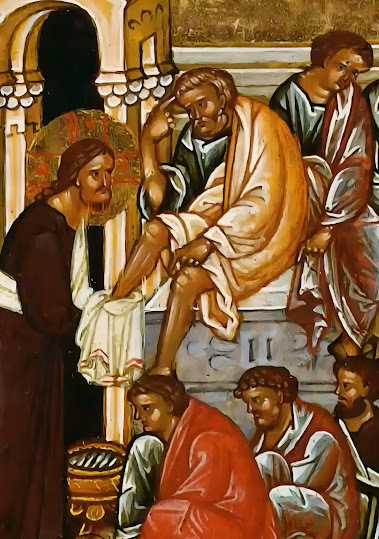 We are often tempted to think that becoming a mature human person means achieving independence, autonomy, and self-sufficiency. We view relationships as merely useful interactions with other autonomous persons that help us or please us or are otherwise subordinated to our ultimate purpose of self-gratification and self-affirmation.
We are often tempted to think that becoming a mature human person means achieving independence, autonomy, and self-sufficiency. We view relationships as merely useful interactions with other autonomous persons that help us or please us or are otherwise subordinated to our ultimate purpose of self-gratification and self-affirmation.When we have this attitude, nothing seems more alienating than sacrifice. Indeed, the claim of Jesus that our vocation consists in the sacrifice of self-giving love for God and our neighbor appears incomprehensible, if not insulting or threatening to our human dignity. The idea of losing-myself-in-order-to-find-myself appears to be a self-negating paradox.
And yet this "losing of myself" in self-abandonment to God is not something that demeans my freedom or results in the loss of my dignity as a person. On the contrary, it is the realization of freedom and of the person. For God Himself is Infinite Self-Giving Love. The Trinity reveals that total-self-giving is at the very root of what it means to be a person.
Jesus says, "I am in the Father and the Father is in me" (John 14:11). And we will fulfill the true meaning of ourselves as persons, we will achieve the destiny and fulfillment for which we have been created, by abandoning ourselves to Him and trusting in Him: "Whoever loses his life for my sake will find it" (Matthew 10:39). We don't "lose ourselves" into nothingness. We lose ourselves by belonging to God and to other persons in Him.
We have been created to become gifts, to realize our freedom as love, to live in relationship as persons, and to "find ourselves" forever in relationship to God the Father, the Son, and the Holy Spirit.
August 21, 2024
"August Art" By JJ
Here are some of JJ's latest "experiments" in digital art, born of the August heat, photographs, the ongoing revolution in digital media techniques, and JJ's own peculiar imagination, the demands of which no amount of filters or AI adjustments or direct manual alterations on screen are able to satisfy.
But at a certain point, one knows that "it's finished," though one is seldom entirely satisfied with the results.
Here are three "reflections" of my local environment that I see all the time and frequently photograph: Virginia Meadows, Blue Ridge mountains ("Signal Knob" is constantly in view), and creeks and rivers—including the fabled Shenandoah River—that have been low on water this Summer of 2024...



August 20, 2024
Saint Bernard: “Love Beyond Measure”
Today (August 20) is the Feast of Saint Bernard of Clairvaux, the greatest of the medieval Cistercian monastic reformers, a contemplative who in his enormous caritas guided monks, ecclesiastics, popes, and the crowned heads of Europe during the often-troubled mid-12th century.
He left many writings, which are honored by his being one of the “Doctors of the Church.” In my social media posts today I cited merely two sentences, which in a way summarize everything. (See text below this detail of Bernard from a medieval illuminated manuscript)

August 17, 2024
Ukraine Invades Russia... Wait, What?
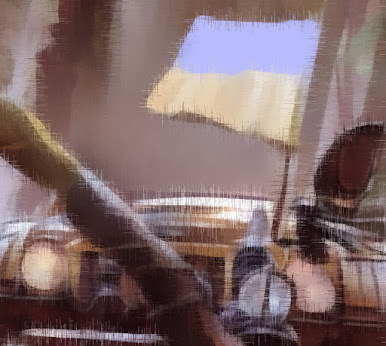 This is old news, in one sense. After months and months of bloody and mostly deadlocked defensive action holding back Russia's attempts to move forward on the frontline in Eastern Ukraine, something totally unexpected began on August 6. Units of the Ukrainian armed forces turned north and crossed the Russian border into Kursk oblast.
This is old news, in one sense. After months and months of bloody and mostly deadlocked defensive action holding back Russia's attempts to move forward on the frontline in Eastern Ukraine, something totally unexpected began on August 6. Units of the Ukrainian armed forces turned north and crossed the Russian border into Kursk oblast.But this remains current news, because Ukrainian troops continue to advance successfully into Kursk. Their stated objective remains defensive: many of the drones that continue to bomb Ukrainian cities and civilian infrastructure have their point of departure in this region. The goal is to take out the most proximate launching pads of Russian bombs and secure a "buffer zone" against aerial aggression while holding whatever territory is taken under a temporary (Ukrainian) military administration. Civilians are not targeted. There appears to be no indication of any intent to carry out "reprisals," although there may be other strategic motives at play.
The strange feature of this manoeuver has been its ongoing success. The Russian border has proven to be poorly guarded, and the troops in the region have been surrendering to the Ukrainians in large numbers.
For a long time, NATO and the West have been limiting Ukraine from using the weapons provided in their assistance packages against targets inside Russian territory, fearing that such use might result in further escalation with perhaps Russia retaliating directly against NATO states, or even using "tactical nuclear weapons" - a threat frequently rattled by Putin's regime over the past two and a half years.
Perhaps there has a loosening of these proscriptions, although Ukraine executed this move on their own, preserving operational security so tightly that they evaded all advance intelligence. They surprised everyone with a brilliant small-scale but (in a certain respect) "full-on" military incursion into Russian territory, with boots on the "Mother Russia's" own ground.
A red line has been crossed.
It's too soon to say what the long-term effects of this shift may be. War is awful and wildly unpredictable, and future scenarios could evolve in many directions.
For the moment, nevertheless, certain indicators are striking. Once again it appears that Emperor Putin has no clothes. Nothing like a coherent response has been forthcoming. The Russian armed forces are not well placed, not well-trained, and not prepared to bounce back from any surprise deviations from a script dictated from the top down. They have lots and lots of human cannon fodder to throw at enemy positions, lots of cheap drones, and weapons supplied by their North Korean and Iranian allies. The whole enterprise remains a disgrace for Russia in every respect. We don't know the extent of Western "disgrace" at present or in the future in terms of drawing out this conflict for their own benefit, abandoning Ukraine at some crucial moment yet to come, or playing the game of "intervening" by using money as a substitute for a real solidarity that is willing to share the risks and responsibilities that the Ukrainian people are bearing in their efforts to defend themselves as a free nation.
What about the nuclear "threat"? While no one wants to underestimate what might be brought on by an act of suicidal fury, there has been very little nuclear rhetoric coming from the Putinistas since August 6. There are factors that make nuclear escalation (and perhaps even conventional escalation) more remote the longer this war goes on. In February 2022, Putin's regime embarked upon the "project" of their "Special Military Operation" not only with their own expectations, but also with what were no doubt the assurances they provided to their relatively new "silent partner" in their investment in Eastern hegemony.
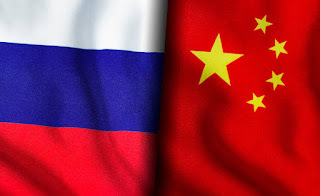 One can only speculate on the details, but appearances indicate that the "silent partner" [not so silent, really] finds itself increasingly burdened by the consequences of Putin's mess, and finds itself more and more bearing the cost (not without some benefits to itself) of Russia's long war and Russia's isolated economy. We are talking, of course, about that Special Unlimited Friendship that was proclaimed just prior to the full scale invasion of Ukraine, that visionary gleam that illuminated the eyes of Emperor Vladimir of All-The-Russias and his "friend," Emperor Xi of the Middle Kingdom and All-Under-Heaven. The latter Empire has the larger claim, but—as has been the practice since antiqutiy—it exercises its claims primarily through "soft power" and its confidence in the superior wisdom of its own system.
One can only speculate on the details, but appearances indicate that the "silent partner" [not so silent, really] finds itself increasingly burdened by the consequences of Putin's mess, and finds itself more and more bearing the cost (not without some benefits to itself) of Russia's long war and Russia's isolated economy. We are talking, of course, about that Special Unlimited Friendship that was proclaimed just prior to the full scale invasion of Ukraine, that visionary gleam that illuminated the eyes of Emperor Vladimir of All-The-Russias and his "friend," Emperor Xi of the Middle Kingdom and All-Under-Heaven. The latter Empire has the larger claim, but—as has been the practice since antiqutiy—it exercises its claims primarily through "soft power" and its confidence in the superior wisdom of its own system.I have begun to think that Xi Jinping and his 90 million bureaucrats (a.k.a. the Chinese "Communist" Party) really believe in their own system of maximum political and social control combined with widespread material prosperity. They see it as a viable option for the governments of emerging nations that China wants (and perhaps needs) to do business with. Russia was supposed to be an asset but has turned out to be liability. I think Xi Jinping would strongly object to Putin crossing the nuclear threshold and throwing the world into a panic. Now more than ever, Xi needs “win-win” international projects, lots of trade, and a secure environment that facilitates investment. China is trying to build a global business, and has its own economic problems in its vast homeland. I’m inclined to believe that China would exercise its “soft veto” (which can be hard too, if necessary) against any nuclear adventures Putin might be dreaming up.
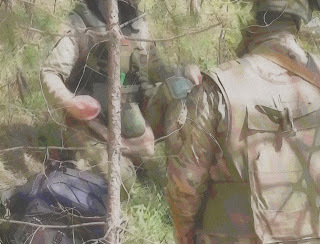 Is Russia falling apart? I hope not. I don't want to see Russia become a junior partner in "the Chinese Dream," even though right now things seem to be moving in that direction. Rather, I want Russia to repent of its own 20th century atrocities in the Bolshevik era and disown the leaders who perpetrated them. Then Russia can begin to build anew.
Is Russia falling apart? I hope not. I don't want to see Russia become a junior partner in "the Chinese Dream," even though right now things seem to be moving in that direction. Rather, I want Russia to repent of its own 20th century atrocities in the Bolshevik era and disown the leaders who perpetrated them. Then Russia can begin to build anew. They also must give up nationalistic political control of the Russian Orthodox Church and allow that great spiritual tradition complete freedom to embark on a path of reunion with its sister churches, especially the too-often-persecuted Ukrainian Greek (Byzantine) Catholic Church and a re-emerged Russian Greek (Byzantine) Catholic Church (which shined briefly for a few months in 1917).
Peace and community in Europe require the healing of the profound underlying wound that has afflicted Europe for nearly a thousand years. We need nothing less than full communion between Eastern and Western Churches. This will be the fruit of a grace for which we must pray ardently.
Meanwhile, the Chinese need a bigger dream—something greater than controlling people's minds while filling their stomachs. This too is worth praying for.
Pray for the courageous Ukrainian people--a people of great hearts and immense suffering. Pray for Russia and China and all the nations of the world.
August 16, 2024
Saint Stephen of Hungary
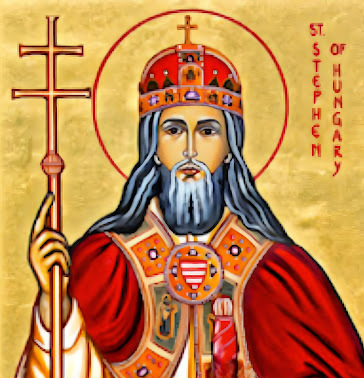 The feast of Saint Stephen of Hungary is August 16. The Hungarian people have a strong Catholic faith, which is expressed in many ways as they continue to affirm their historic identity, dignity, and stature in Europe. Saint Stephen obviously plays a crucial role in bringing together the Hungarian people even today. The text that follows is the “conversion story” of Saint Stephen, which I wrote for the April 2019 edition of Magnificat magazine. I thought it might be helpful to re-present the text now. Here it is:
The feast of Saint Stephen of Hungary is August 16. The Hungarian people have a strong Catholic faith, which is expressed in many ways as they continue to affirm their historic identity, dignity, and stature in Europe. Saint Stephen obviously plays a crucial role in bringing together the Hungarian people even today. The text that follows is the “conversion story” of Saint Stephen, which I wrote for the April 2019 edition of Magnificat magazine. I thought it might be helpful to re-present the text now. Here it is:The story of the conversion of Saint Stephen is inseparable from the story of the thousand year old Hungarian nation. Stephen was the protagonist who forged a warlike and unstable ethnic group into a Christian Kingdom in central Europe. Several new nations emerged during the tenth and eleventh centuries in Europe. At the beginning of this period, a variety of tribes and migrants dwelt at the boundaries of the Byzantine Empire and the remnants of Charlemagne’s realms (that were undergoing a process of Germanic revitalization).
Among these were the Magyars (called “Hungarians” by the Byzantines), a nomadic confederation originating around the Ural mountains. In the ninth century they crossed over the Carpathians, and conquered and settled the plains around the Eastern portion of the Danube river. From there they began to raid and pillage the Western and Byzantine Empires. At the same time, as they adopted a more settled lifestyle, they were influenced by the older European societies and gradually welcomed Christian missionaries and converts among themselves.
Missionaries approached primitive, dangerous, violent new peoples by seeking to gain converts among the leading families and, if possible, the chieftans. Both Latin and Byzantine missionaries began to have success among the Hungarians by the middle of the tenth century. But it was the intrepid Saint Adalbert of Prague who finally baptized Geza, the Grand Prince of the confederacy in the year 985. Baptism was mostly a political arrangement for Geza, but it was clearly something more for his adolescent son who was also baptized on that day.
Young Prince Vajk took the name “Stephen” at his baptism. He also found a mentor in the learned, wise, and energetic Adalbert. Illuminated by faith in Christ and the guidance of this great missionary bishop, Stephen sought to become more than just another Magyar warrior chieftan. He aimed for something that, in retrospect, we might call an achievement of Christian humanism: to transform the barbarous, theiving, raping, murdering pagan Hungarians into a civilized nation at the crossroads of Europe, a nation whose people were suffused with the hope of salvation in eternal life, and who lived in peace and freedom in the present world.
We often forget that the ideal of the Roman Empire was very much alive in the Middle Ages. It was an ideal that developed not only in the direction of a universal earthly Emperor, but also in the direction of identity and freedom for a wide variety of peoples under their own local rulers. The ideal aimed at both solidarity and subsidiarity, although these two aspects nearly always conflicted in practical life.
The Hungarians, moreover, were positioned between two Empires, the Byzantine and the newly invigorated Holy Roman Empire. When Stephen became Hungary’s first king, however, he received the crown directly from Pope Sylvester II, insuring both the political independence and Catholic identity of his people.
Uniting and Christianizing these people, unfortunately, was not accomplished without the use of force and even brutal tactics. However we must understand the many actions and flaws of King Saint Stephen in the context of their time and place, where “imposing Christianity” was often inseparable from establishing the rule of law and basic human civility on a collection of warlords and bandits. The Hungarian people to this day remember his legacy with gratitude and devotion.
August 15, 2024
Mary Goes Before Us on the Journey to the Fullness of God
Some words from Pope Francis from the Angelus for today’s Solemnity of the Assumption of the Blessed Virgin Mary, Mother of God and our Mother. (Courtesy of CL Instagram)

 Mary’s “Dormition”/Assumption, Anonymous carved ivory, 13th century.
Mary’s “Dormition”/Assumption, Anonymous carved ivory, 13th century.
August 14, 2024
Love Stretches Out a Hand to All
Saint Maximilian Kolbe offered to take the place of another prisoner designated for reprisal-execution in Auschwitz.
He gave his life on August 14, 1941 as a witness to the Love that is greater than the most hideous violence, the Love that redeems and saves the world.

August 12, 2024
Saint Jane de Chantal: “Hold Your Gaze Upon God”
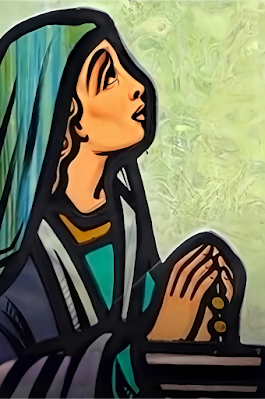 Saint Jane Frances de Chantal (1572-1641) was a noblewoman, a baroness, a wife and mother, and then a troubled young widow who encountered Saint Francis de Sales and—under his direction—found a deeper vocation to serve God wholly: first through raising her children and caring for her estate, and then as the foundress of a women’s religious congregation, the Visitation Order.
Saint Jane Frances de Chantal (1572-1641) was a noblewoman, a baroness, a wife and mother, and then a troubled young widow who encountered Saint Francis de Sales and—under his direction—found a deeper vocation to serve God wholly: first through raising her children and caring for her estate, and then as the foundress of a women’s religious congregation, the Visitation Order. In a life of diverse experiences and responsibilities, trials and sufferings, she became a woman full of great Christian wisdom. Her counsels on trusting God in every circumstance and in the whole of life continue to encourage us today:
“Do not trouble yourself anymore because you have no feeling... It is not a feeling of faith or of hope that will save us, but rather what we do, supported by the mercy of God.... Hold your gaze upon God in patience and let him do what he wills... Stand firm and endure, without reflecting on all that is going on within you. Leave all that to God without giving it a thought...
“All you have to do is, from time to time, to utter a few words, above all the following, which may be your only prayer: 'My God, into your hands I commend my spirit," or perhaps: 'My God, my soul is in your holy grasp…. To you I leave all care of it and wish nothing further than to take heed of your will alone…. My joy will be found in heaven and none other holds my heart….' ”


August 9, 2024
Edith Stein: Sharing the Sufferings of Christ
"Human action cannot help us, but only the sufferings of Christ. My aspiration is to share them" (Edith Stein, Cologne, Germany, 1938).
#SaintTeresaBenedictaOfTheCross #August9




